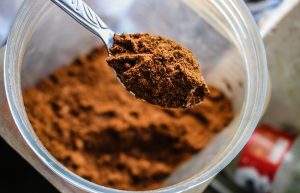 Walk into any health food store in Texas, and you’ll find a variety of protein supplements. Some show bulging muscles on the front of the can, while others are more subtle in their advertising. Are they beneficial? Should everyone take them? One point is that supplements, protein or otherwise, should never replace healthy eating. Protein supplements won’t replace a balanced diet. Using them to replace a healthy diet can and does negatively affect overall health. Supplements can benefit some people but can hurt the health of others.
Walk into any health food store in Texas, and you’ll find a variety of protein supplements. Some show bulging muscles on the front of the can, while others are more subtle in their advertising. Are they beneficial? Should everyone take them? One point is that supplements, protein or otherwise, should never replace healthy eating. Protein supplements won’t replace a balanced diet. Using them to replace a healthy diet can and does negatively affect overall health. Supplements can benefit some people but can hurt the health of others.
Your age, activity level, and weight are considered when consuming extra protein.
Active people require more protein than sedentary people. The more active you are, the more potential there is for mini tears in the muscle and the necessity of protein to do repairs. A sedentary person requires 1.2 grams of protein per 2.2 pounds of body weight. An extremely active person needs 1.6 grams per 2.2 pounds. A heavier person requires more protein than someone who weighs less. As people age, their processing of protein becomes less effective. That can potentially require increasing protein intake to offset.
Even though protein supplements can benefit some, they can be dangerous to others.
Older people may benefit from supplements for other reasons besides processing. Some may have difficulties eating, whether due to appetite or physical problems. While people attempting to build muscle mass often purchase supplements, in many cases, a healthy diet can provide adequate protein. Over-supplementation can negatively create or exacerbate certain health conditions. It may cause minor problems like irritability and headache or lead to more severe ones, such as blood vessel disorders, kidney or liver disease, seizures, or cardiovascular disease.
If you use protein supplements, choose carefully.
Always do your homework when choosing any supplement. The FDA doesn’t regulate supplements. Some organizations do, like the third-party testing facility, NSF International. They ensure the product doesn’t contain toxic compounds like mercury or arsenic. If it passes, their designation of “Certified for Sports” will be on the label. Check the ingredient label. Manufacturers often add ingredients to make it more palatable, like sugar or thickeners to give a better consistency. They also add chemicals to extend shelf life. The Clean Label Project tested many supplements. They found 130 types of toxins in protein powders. Some contained heavy metals like mercury or arsenic and other toxins like pesticides or BPA.
- You can boost your recovery after a workout with a protein shake, but a hard-boiled egg and whole-grain toast are just as easy. The second option also provides fiber and other nutrients.
- Read the ingredients thoroughly if you use protein bars as a supplement. Many are no more than glorified candy bars with a high sugar content and empty calories.
- Getting adequate protein is vital for every cell. It’s a building block for bones, blood, muscles, cartilage, and skin. Don’t avoid eating protein because you worry about eating too much. It’s difficult to do.
- Always consult with your healthcare professional before using any supplement, including protein. Be aware of the ingredients used. If you’re lactose intolerant, consider plant-based protein supplements.
For more information, contact us today at Rising Fitness Gym
